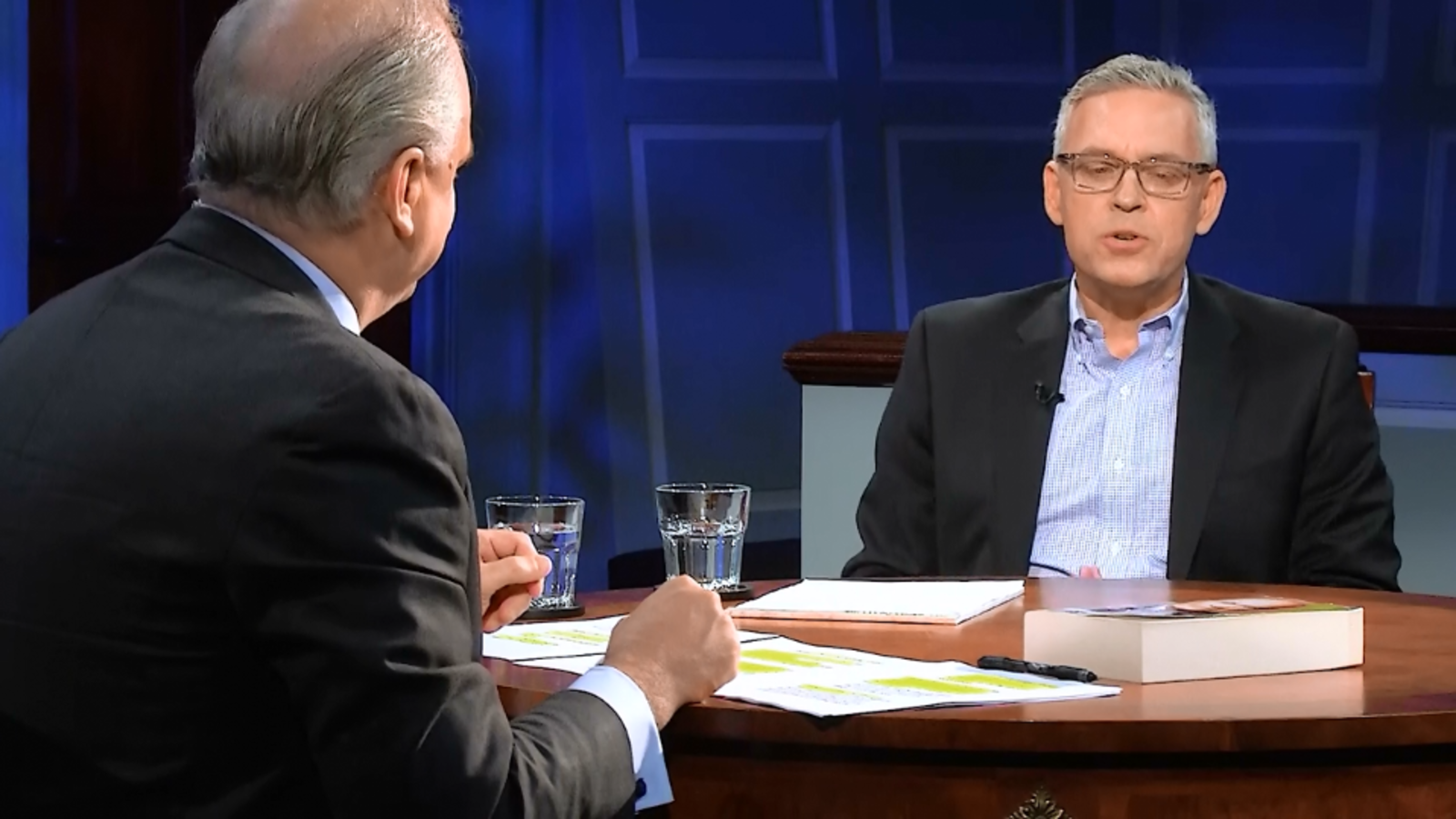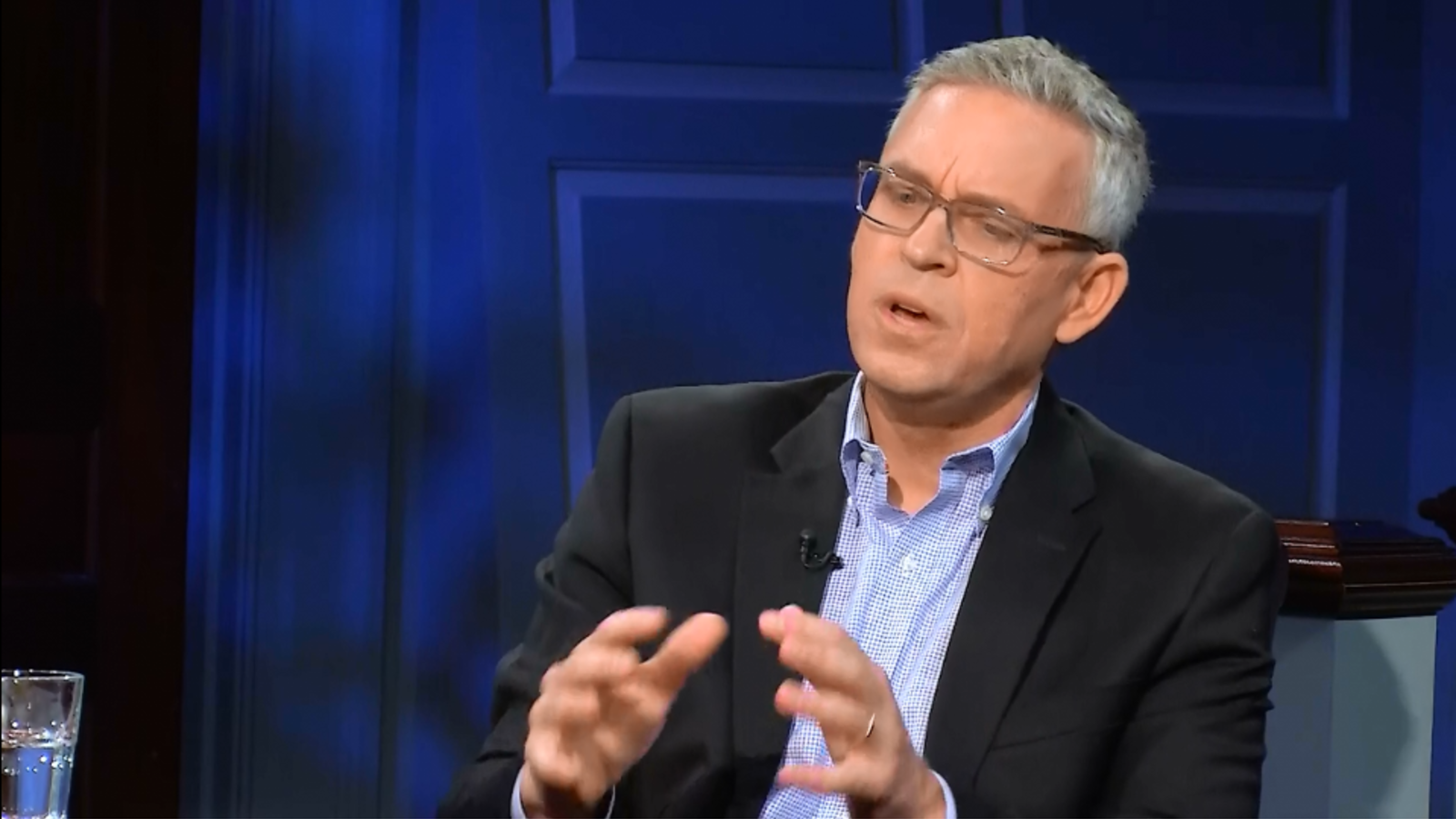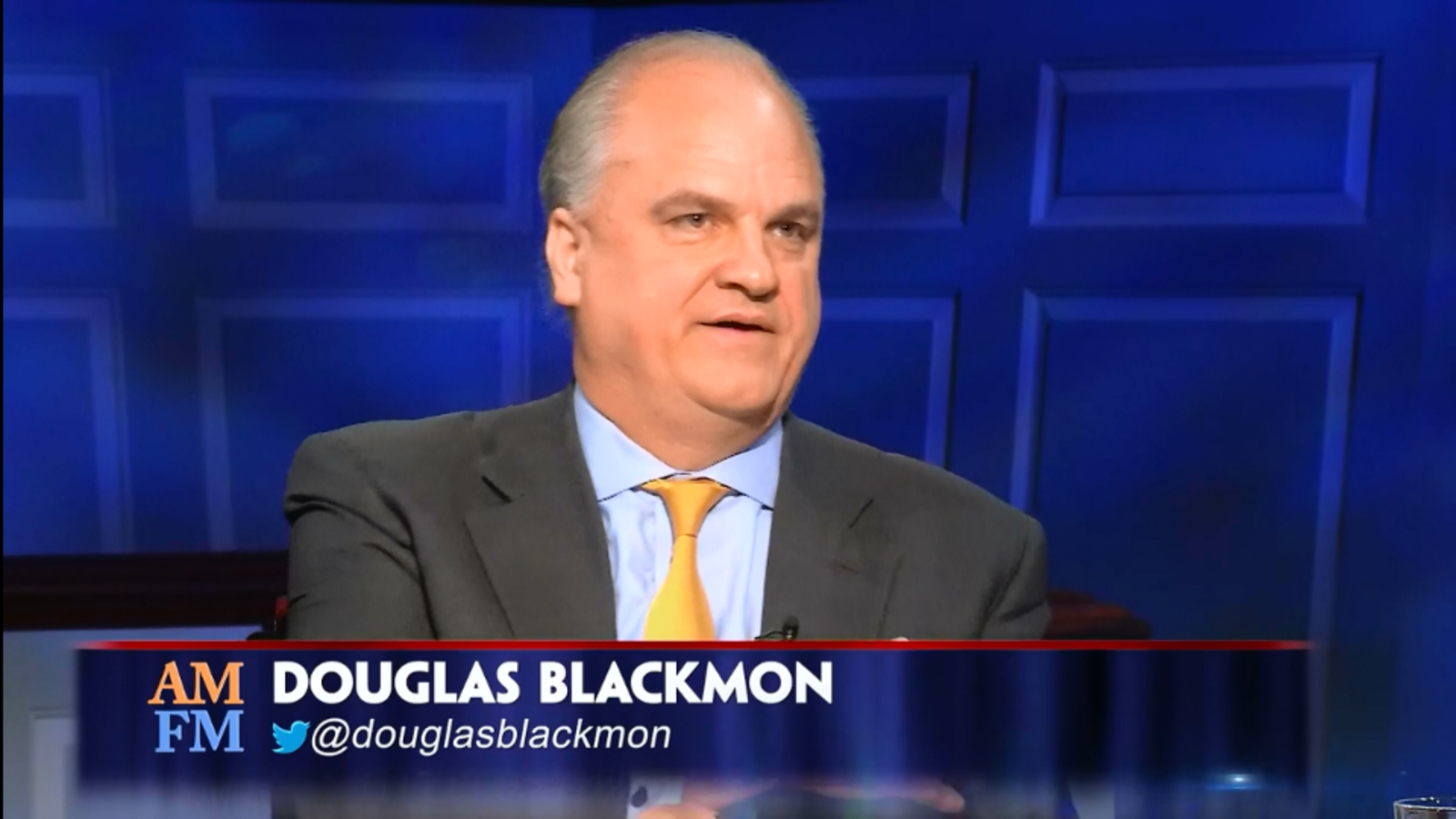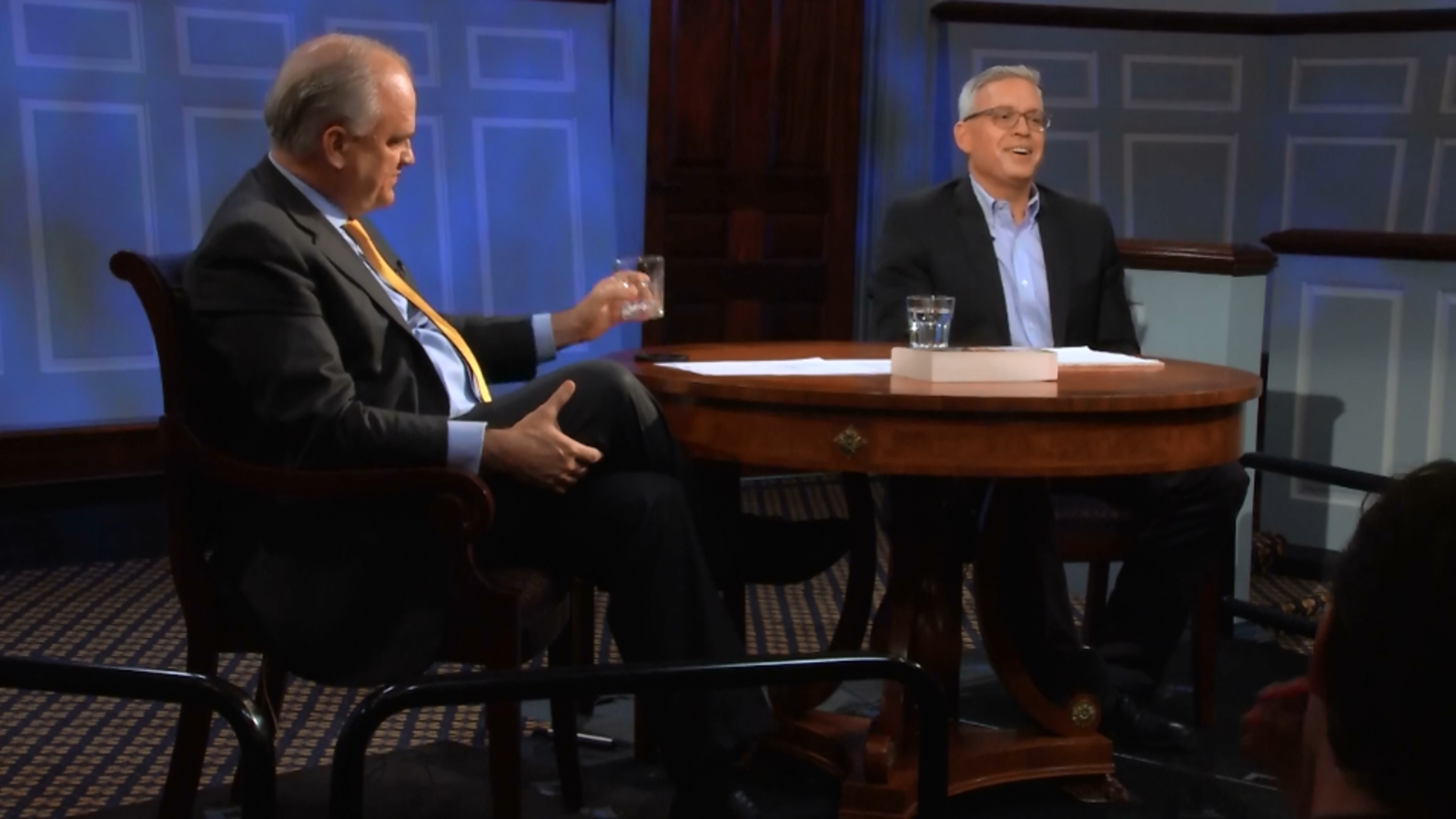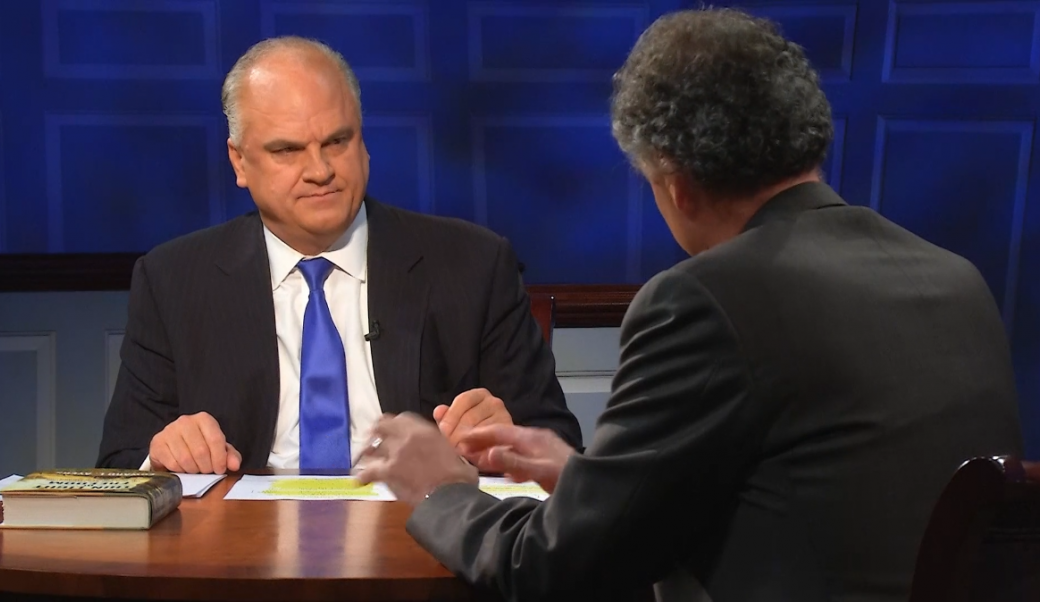About this episode
March 07, 2018
Will Hitchcock
Hosted by Douglas Blackmon
Many historians now rank Dwight D. Eisenhower among the best presidents of all time. Rather than out-of-touch or apathetic, Eisenhower is seen as exemplifying presidential patience and prudence, a fiscal conservative, and, for his time, a social liberal who appreciated progressivism. He had led Allied troops to victory and, a decade later, appeared to quietly usher in an optimistic, invincible American era. Joining us to examine the complex legacy of Ike is WILLIAM HITCHCOCK, a professor of history at the University of Virginia and a fellow at the Miller Center, where we broadcast American Forum. His forthcoming book, The Age of Eisenhower: America and the World in the 1950s, is an extraordinary exploration of the life, times, and relevance of our 34th president.
Founding and Shaping of the Nation
The Last Real Republican?
Transcript
00:41 Doug Blackmon: Welcome back to American Forum. I’m Doug Blackmon. A lot of Americans today look back at the 1950s with a strong sense of nostalgia for what our hazy collective recollections remember as a time of peace in the wake of World War II, prosperity, and a president who had led Allied troops to victory and, a decade later, appeared to quietly usher in an optimistic, invincible American era. His name was Dwight D. Eisenhower. It was never as simple as that, of course. If you were black in America in the 1950s, things didn’t look so grand. If you lived in Guatemala, Iran, or what was then called French Indochina, and you aspired for change in your country, the United States wasn’t necessarily your friend. And Eisenhower himself wasn’t always exactly what he appeared to be. Ike was elected president in 1952 on his stature as a military leader. A West Point graduate, Eisenhower first displayed the patience and perseverance that would become his trademark as he ascended the military hierarchy between the world wars. In 1942, he commanded the successful Allied invasion of North Africa, was rewarded with higher rank, and then, as Supreme Commander of the Allied Expeditionary Forces in 1944, he planned and executed Operation Overlord, the storming of Normandy’s beaches on D-Day. After German and Japanese surrender in 1945, Eisenhower was a hero. For most Americans, he seemed the perfect fit to lead the country in a new era of threats including civil rights tensions and the looming new shadow of Soviet Communist expansion. Yet Eisenhower’s two terms as president were long criticized as passive, complacent, and do-nothing.
More recent analysis and our guest on this episode have turned that narrative on its head. Rather than out-of-touch or apathetic, Eisenhower is seen as exemplifying presidential patience and prudence, a fiscal conservative and, for his time, a social liberal who appreciated progressivism. Many historians now rank Ike among the best presidents of all time. Indeed, from the perspective of the present, the record of his life and achievements constitutes an extraordinary commentary and not a positive one on just how coarse, ineffective, and irresponsible so much of the politics of America in the twenty-first century have become. Joining us to examine the complex legacy of President Eisenhower is Will Hitchcock, a professor of history at the University of Virginia and a fellow here at the Miller Center where we broadcast American Forum. He’s a good friend of mine, too. His book The Bitter Road to Freedom: A New History of the Liberation of Europe was a finalist for the Pulitzer Prize, a winner of the George Louis Beer Prize, and a Financial Times bestseller. His newest book, arriving in stores everywhere this month, is an extraordinary new look into the life, times, and relevance of our thirty-fourth president titled The Age of Eisenhower: America and the World in the 1950s. Thank you for joining us.
Will Hitchcock: Thank you, Doug. Good to be here.
3:35 Blackmon: A, what’s really new here, and, B, this thing you refer to in the subtitle—or the title, that you refer to in the title, the “Age of Eisenhower,” did that really exist?
Hitchcock: Golly, I sure hope so, because I spent a long time trying to make the argument. But, no, what’s new in this book is, as you suggested in your intro is that Ike has largely been written off by too many postwar histories as essentially a good man in an easy time of peace and prosperity whose fam—was made famous by his role in World War II. Uh, and during the 1950s he kind of had it easy. This was a time of peace. It was a time of prosperity. Eisenhower was the right man for that era because, after all, he really liked just playing golf and going fishing, and he sort of presided in a father-knows-best style over American culture, which was rather placid and so forth. That’s totally wrong. The 1950s was a dynamic time, a time of social change, a time of racial change, a time of danger. I mean, Eisenhower called it an “Age of peril” because of the Cold War, and what struck me about working on him—and I have to say I wasn’t sure what I would find—and beginning this project I didn’t start out with this as a thesis. But I found that Eisenhower was without a doubt one of the most consequential—that means important, significant, impactful presidents of the post-1945 period, I mean, really since Franklin Roosevelt. I would rank him as having had enormous consequences for modern America not just in his—in his eight years in office, but subsequently. I mean, I needn’t—I won’t go, uh, into it—in detail, but think of the areas in which he shaped America, buil—
FACTOID: 2017 C-SPAN survey ranked Eisenhower 5th best president ever
5:15 Blackmon: Like what?
Hitchcock: —well, building out the warfare state, making in peacetime—remember, in peacetime, creating a—what he would later describe as a military industrial complex. Ike built that.
FACTOID: In 1960, U.S. military spending was 8.4% of GDP; in 2016, 3.3%
His role in, uh, essentially bringing the Republican Party from the far right of the 1920s and thirties into the center, creating an idea that government could be effective, small, fiscally conservative, but responsive to real people. And then I think, uh, another way in which I found him really consequential—and this will, uh, resonate, I think, today—Eisenhower gave us a model of presidential leadership, of presidential behavior, if you like. I call it in the book the “disciplined presidency.” He believed the system could work with good leadership. He didn’t believe the system was broken. He believed the system was there to be used to effect change, uh, and to improve lives, but he stuck to a number of specific goals. He used the machinery of government effectively. He especially used the office of the presidency, I think, effectively, and he carried himself in such a dignified manner, and I think that in particular really captures this sense that he presided over that era. His personality really defined the era. So what’s new here? Ike mattered. That’s the takeaway.
6:35 Blackmon: A criticism that’s often made about our current, uh, national leadership, but it really extends back to this time, is that the primary question of American foreign policy certainly by now has become over and over again one question: do we intervene militarily or not? You know, that’s sort of—everything comes down to that. Every crisis in the world begins with that—with that question, “Do we send in troops?” And in some respects, I think you can make the case that after a whole of American history up to World War II where the presumption was, “Well, we be—definitely shouldn’t send troops to this unless we absolutely must,” Eisenhower introduces a new way of thinking that—that begins to take us to where we are now.
Hitchcock: Right. Right. Well, I would say that—so after—you’re quite right in your—in the narrative arc. After World War I, there’s a period of demobilization and—and turning away from, uh, the tools of war and—and so forth. And after—after World War II, when America had done so much to mobilize for war and which Eisenhower had done so much to contribute to that, there is a long period of demobilization and moving—you know, trying to—to move back to a peacetime economy. Eisenhower came into office in 1953—well, and, of course, in the middle of—towards the end of the Korean War, and he basically said, “We have to avoid this stop-and-go policy towards defense readiness.
FACTOID: Armistice signed July 1953 ended Korean war after three years
We must always be ready to wage war around the world when we are called upon to do so, because it’s bad to sort of have this sudden rush of defense spending and then threaten the national economy.” And so, what he argued for was the reasonable and restrained institutionalization of a permanent defense industry.
And that sounds paradoxical, contradictory in fact, and, indeed, during the 1950s the United States spent about ten percent of its GDP on defense spending, which is an enormous sum, and it is greater than any peacetime government ever since. So what he was suggesting was, “We need to build up our defense capabilities,” but why do we need to do that if we’re not going to wage war? After all, Eisenhower toiled very, very, uh, ardently to avoid conflict. But that’s the key to his Cold War policy: prepare for war so that you don’t have to wage it. Now, you referred to a number of incidents of intervention, which Eisenhower managed to avoid, uh, but he was always prepared to use the tools of war if called upon. I think that car—captures his sense of discipline and restraint. Yes, we have to prepare for the coming conflict. The world is a dangerous place. In order to deter our enemies, to intimidate them, Russia, China, we’ve got to be ready at any time, and that meant staying ahead of the competition. But at the same time, he was very reluctant to use the tools of war when he could avoid them through diplomacy or other covert means, some of the means you mentioned.
9:16 Blackmon: It is striking that some of—Guatemala is not at the center of our global, uh, diplomatic, uh, struggles today, though it’s actually—what’s happening in Guatemala today is actually of some important, uh, and speaks to the immigration debate in the country, but certainly Iran, Syria, um, French Indochina—
FACTOID: U.S.-backed coup forced President Arbenz to flee Guatemala in 1954
Hitchcock: Right.
9:26 Blackmon: —which, subsequently Vietnam, these places that, uh—that even today, where Iran is at the center of—of—
Hitchcock: Yeah.
Blackmon: —global conflict, you can make the case that, uh, the Eisenhower approach to that, uh, set the stage for all the bad things that have happened since.
Hitchcock: You can. You can. I mean, the way Ike looked at it, again, we know what happened. They didn’t, so we have to give them that. But the way Eisenhower looked at covert operations, which just generally speaking, was he came to it from his experience in the Second World War. If someone had come to Eisenhower in 1943 or 1944 and said, “You know, I can put an exploding cigar in Hitler’s, uh, dressing drawer, you know, and when he takes out his morning smoke, poof, up he goes,” Eisenhower would have said, “Go for it. What could be better? Uh, use these secrets. Uh, use whatever available resources you might have.”
10:22 Blackmon: If he’d had drone technology, he’d have no problem with it.
Hitchcock: If—oh, absolutely not. He also relied daily on intelligence reports that were gathered from spying, so he came to this as a soldier. The use of secrets, of covert operations, of resistance, of sabotage, of blowing up the enemy, blowing up bridges, killing your, uh—your enemy with a dart to the neck, whatever it was, he was all in favor of that. So, he comes into office, and a British plan is already on the table, which the CIA picks up, to overthrow Mohammad Mosaddegh, the nationalist but somewhat wobbly, maybe a little too lefty, uh, elected prime minister of Iran.
FACTOID: Operation Ajax (1953) installed General Zahedi as prime minister
Why? Because he’s nationalized the oil industry. The British, which control all of the petroleum manufacturing in Iran at that time don’t like it, so they come to the United States, and they say, “This guy might be a Communist,” and that can only mean bad things. And Eisenhower is persuaded that if Iran should “go Communist” this could lead to Communization of the Middle East. Now, already we have a sequence of possibilities that, um, are probably somewhat implausible, we now know, but he didn’t necessarily know that. And what he was told was, “We can do this secretly. We can do it cheaply. The British will help us. Our allies will help us, um, and we have plausible deniability.” It took him about a weekend to agree to proceed with this proposal, because the idea of overturning this government and reinforcing the powers of the shah appealed to him on Cold War grounds. We look back and say, “That was a misjudgment. It was an abuse of power. It was the wrong thing to do.” It certainly led to, uh, twenty more—twenty-plus years of tyrannical rule in Iran, and I think we have to acknowledge the policy in the long run failed.
12:03 Blackmon: Yeah.
Hitchcock: But in the short run, Eisenhower felt, “This is how you wage the Cold War. What’s more, you do it on the cheap.” They spent about a million bucks to overthrow the government of Iran. For Eisenhower, waging the Cold War on a budget, that’s a deal he would take every time. So I’m not trying to legitimate it. I’m just trying to explain how he saw the world in 1953 when this operation unfolded.
12:23 Blackmon: As I was reading the book, I was struck by the, uh—the sense of a life of—a person whose life represents essentially, uh, this epic change in all of not just American history but the nature of American life. There’s a man born in 1890. He’s born in 1890, six years before the Plessy v. Ferguson decision by the Supreme Court, uh, embraces segregation and creates, you know, this sort of old—this ancient world of America that is hard for us to even believe existed.
FACTOID: 7-1 court ruling favored Separate-But-Equal Doctrine of Segregation
Well, that’s the—you know, he’s six years old when that happens. He’s growing up in this, um—in this sort of world, this America that is doing all sorts of terrible, terrible things at the beginning of the twentieth century internally. It’s this country that still believes that if we win—you know, that we can go out and defeat the bad guys and defeat them forever and—we tried once. “Oh, it didn’t work. Oh, let’s do it again, and it will work.” But then, he becomes this national leader, this post-military leader, uh, at a moment that begins this duality that we still live in of—that we believe we are the good guys and that we always are going to be on the right side of things, but, actually, forever vanquishing the enemy is not ever going to be possible. And so there is this kind of compromise—
Hitchcock: Yeah. Well—
Blackmon: —uh, that has to be accepted.
Hitchcock: One of the characteristics that I think I now have come to really love about Eisenhower—and it took me a while, because I’m a twentieth-century—twenty-first-century person. I’ve a sort of sense of cynicism about politicians. Eisenhower was without a doubt the most authentic and truly heartfelt American you could find.
FACTOID: Americans who trust government fell from 73% (1958) to 18% (2017)
And I say that because it—it sounds corny, and that’s exactly who Eisenhower was. He believed so strongly in the American idea, and when we talk about, you know, “Well, government is broken. Government can’t do anything. Government is a failure. Uh, Republicans should always be against the government. That’s the best way to get into power,” Eisenhower’s view was, “Wait a minute. The government of the United States mobilized, uh, one hundred and fifty million people during World War II and put sixteen million of them into uniforms and sent them around the world to destroy tyranny. That’s what the government did.” So, he always had a sense of pride about what America had done to advance global freedom. He never stopped thinking about that and believing in that as a mission. And if that meant building a permanent warfare state and building a permanent industry, uh, military industrial complex or building a surveillance state, if you like, his view was, “It was worth it.” He felt he could contain those things. He felt he could contain the military. He felt he could direct, uh, the CIA and not let it drift off into abuses, but he felt that the price was worth it because the goal was so important. And I—I just—I feel that he is a voice from an earlier time in which Americans were not cynical about the broader purposes of, uh, America in the world. He was truly an internationalist. He truly believed that America could become an example to the rest of the world. Everything about his life was about public service. He spent his entire life, essentially, as a federal employee. And although he was a small-government conservative, he also believed America had a global mission, and he never for a moment doubted that. And if it meant, uh, standing picket on the frontiers of freedom—and that’s a corny phrase from that era—he would say, “Sign me up. I’m there. I’ll be there every time.”
FACTOID: Ike: Not U.S. goal to be “richest nation in the graveyard of history”
15:40 Blackmon: You wrote a piece, where you listed five Eisenhower ideals that GOP candidates, uh, would need to adopt or should adopt to win the presidency in 2016. Those were, roughly, “Run as a conservative, but remember to be compassionate; remind citizens that paying taxes is a civic duty; speak well of our allies; use religious faith to unify the people rather than divide them; don’t kill government, make it work better.” Now, the guy who ends up getting the Republican nomination and then wins the presidency, uh, was 180 degrees the opposite, I think, of—
Hitchcock: He didn’t get the memo.
16:16 Blackmon: He didn’t get the memo. So what would Eisenhower say about the politics of our time?
Hitchcock: Oh, well, he’d be so disappointed and so—feel like a fish out of water. Let me just take two of those threads that you mentioned. You mentioned those five things, but one was that paying taxes is a civic duty. Eisenhower really believed that, and, you know, he really believed that taxes was the obligation that you had in return for all the good things that you got by being an American citizen, that citizenship is a bond.
FACTOID: Trump: Legally not paying federal income taxes “makes me smart”
It’s a deal. Um, we’re going to give you the right to be an American citizen, have all the blessings in being in the United States; you’re going to pay taxes, and rich people are going to pay a lot more. The top marginal rate in the ’50s was ninety percent, and Eisenhower felt, “Well, if you’re super rich, you can afford it.” Um, they—he did reform the tax in 1954 Internal Revenue, uh, Act, but they—it did not significantly reduce it. He basically believed in redistribution, in a sense. Now, that is not a popular idea in Republican circles, to say the least, and I think Eisenhower would have tacked away from that if he were moving into the modern period. But there’s a principle at the core of this, which is that those who have the most should offer the most. And again, coming out of his poverty-stricken background, I think he felt that’s only fair.
The second thing that you mentioned that I would point to is religion, religion in the public sphere. Uh, Eisenhower in the 1950s—you know, it’s characterized really by a lot of public piety. Um, I would say that there is still a great deal of religion in the public sphere today, but it’s become a bit more sharp-edged, a bit more us-versus-them. Eisenhower’s view of religion in the public sphere was inclusive, that basically Americans should—wherever they come from, should be people of faith and—full stop, because after all what—in his view, what made America distinct was this belief that somehow this was a—that the country was built in a—kind of, um—to pursue the talents of individual people as God created them, and that God was at the—somehow at the center of the American experiment. Eisenhower fully believed that. He, uh, was, as some of you may not know—but he was baptized while he was president because he came from a nonconformist, uh, Mennonite background where they didn’t do infant baptism, and he was—when he came into office, he felt the president must be a religious and a spiritual figure. So he was baptized as a Presbyterian in the first, uh—second month of his presidency because he felt so strongly about this issue. Mind you, he had read every line of scripture in his family’s living room with his father breathing down his neck as a young boy, so he was a very deeply spiritual man, but just not in a formal church. So that’s an example. Of course, then, he also happily introduced the phrase “under God” in our pledge of allegiance, and he championed the idea that we should put “In God We Trust” on our currency, that kind of thing.
FACTOID: Original pledge written by socialist minister Francis Bellamy in 1892
So, again, you may not like that today. You may think, “Well, that’s really going too far,” but that’s who the man was. That’s who the—that’s what the era was, a sense of public piety, public decency, and that carried over into the way he carried himself.
So you asked, you know, what would he make of our political climate today. Well, he’d be appalled by it. He’d be absolutely repelled by it. Um, he wouldn’t know how to find himself in it, the vulgarity, the self-interestedness, the sense that, “Why do you go into politics? So that you can make net—so that you can network so that when you leave office you can go become a lobbyist.” Nothing could make him more filled with rage, the idea that somehow politics was an avenue to personal enrichment. That would just shatter his idea of what public service was all about. So, I think, you know, I’d love to bring him back from the, uh, great beyond and just have him give a nice, long national lecture in some way about civic values. (laughter)
20:04 Blackmon: You know, this is the last episode of American Forum. You’re the last guest on this program. What this whole project has been about—and it goes back forty years—and what really this institution that we’re broadcasting this from, uh, the Miller Center at the University of Virginia, uh—it’s born out of the toxic atmosphere in the national discourse in the aftermath of the Nixon presidency. Uh, it’s a place that’s created to foster civil dialogue and to put citizens and scholars and policymakers together in one place to learn from each other, the idea being that, uh, that would make for better politics in America. We clearly failed, uh, over the last forty years, (laughs) but the—but we’ve pursued it earnestly. Over time, that finally became what is now this, uh—that process became this television program. But the purpose of all of this has been to advocate for the idea that people can engage in a dialogue with one another even when they disagree deeply. Uh, you can be patriotic and in fierce disagreement at the same time. Uh, it strikes me that Eisenhower would have said that, uh—that that’s the kind of serious civic dialogue that American citizenship calls for.
Hitchcock: I think not only Eisenhower would have approved but so many of your fans and your followers have approved of what you’ve done over the last few years. And I think you’ve carved out a space for a national conversation about difficult political issues, and, boy, do we need it badly, because we’re so polarized. We’re so sharply, uh, in our—off in our corners, not hearing, not listening. This program was about talking, about listening, about sharing, uh, and it was about hearing from points of view all across the political spectrum. So, um, Eisenhower would have given you the thumbs-up, but, um—but perhaps more important is so many of your contemporaries have watched with fascination and interest and have followed your work, and you’ve really done something important for the country.
21:58 Blackmon: Well, I appreciate that, but, uh, you’ve written a great book, an important book, because I think it speaks to that, uh—you can be a Democrat, and you can be a Republican. You can be a good American, all those things, and you can disagree with everybody, uh, and I think you capture that. And it’s a—this is an important—it’s not just the Republicans that are having trouble these days on these issues. Uh, but I think the Republicans have a bigger and more complicated, uh, tangle to unwind to get back to the—really the core values that Eisenhower represented. But congratulations on the book.
Hitchcock: Thank you, Doug.
22:30 Blackmon: And now, a final act of housekeeping, it’s time to say goodbye. After a four-decade run beginning as an informal series of public dialogues here at the Miller Center in the 1970s and ending with a weekly television show on more than two hundred public television channels and in almost every market in America, this is indeed the last episode of American Forum. I feel a bit like whoever will be the last actor to play Dr. Who on that venerable BBC television series. (laughter) But I inherited an extraordinary tradition of thoughtful and intelligent conversations and an ethos that valued patriotism above political differences and embraced citizens as meaningful, even crucial participants in the decisions shaping our country. It has been a great ride. I’m honored to have hosted nearly 250 episodes and gotten to work with an extraordinary team of dedicated professionals and scholars. This job allowed me to meet and engage with hundreds of the best minds and most genuine leaders in America. I also got to meet some duds, but that comes with the territory. (laughter)
Most importantly, I had the pleasure of interacting with thousands and thousands of you, the people who watched this program on PBS stations, Facebook, Twitter, and all manner of other means and came here to be in the live audience. You proved to me over and over again that no matter how bleak our politics and national discourse look—and they do look bleak right now—there are millions of Americans who are ready and able to preserve our future and protect our democracy even from the internal threats of demagoguery, racism, and political opportunism. And those millions of people are conservatives and liberals and members of every party. The kids in South Florida who survived our most recent national tragedy of gun violence are showing just how strong our future can be. Whether or not you agree with what they are calling for, those teenagers are proving once again that our society is one shaped and governed by the people, and our aspirations for freedom and a future still more remarkable than at any time in our past or the present. Those are the good guys, and they are not slinking away from the ugliness of our national leadership. They’re going into battle. They’re going to win the future for all of us. Thanks for letting me sit here every week for the past six years, and as always, if you’d like to share your thoughts, I’m easy to find and always will be at the email on your screen or on Twitter, @douglasblackmon. I am Doug Blackmon, and this is the last episode of American Forum. God bless America, and all of you. (applause)
